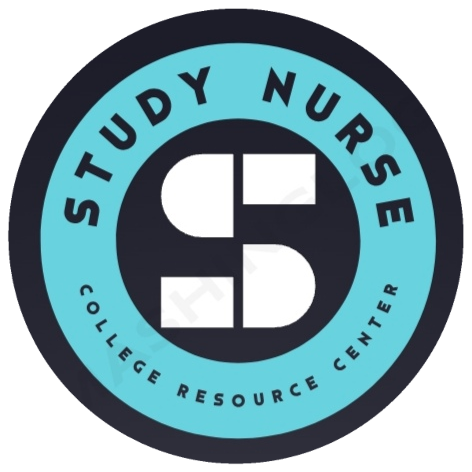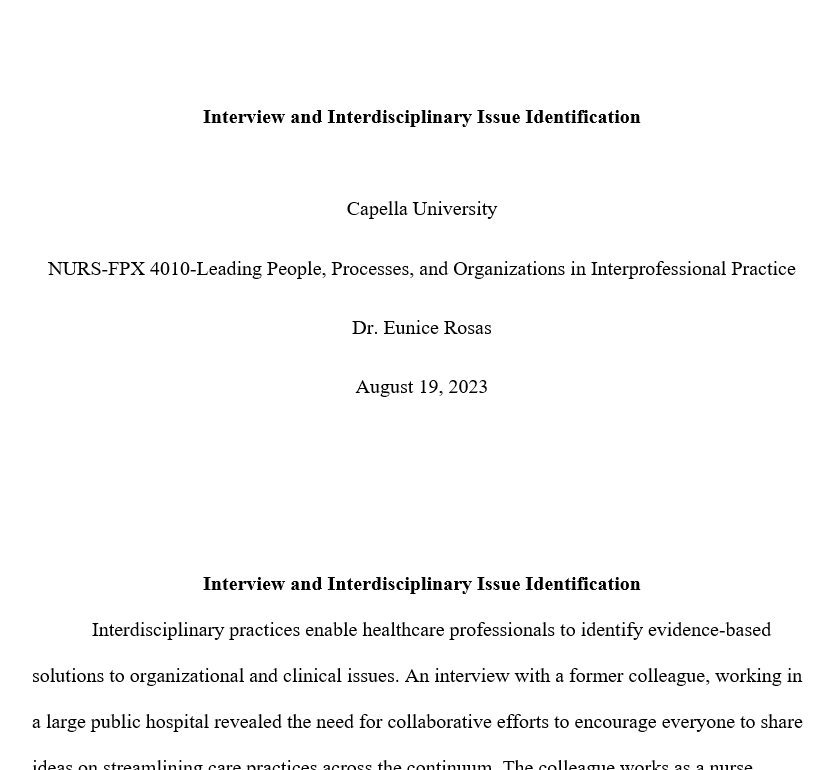NURS-FPX4010_O_Assessment 2-2.edited.docx
Interview and Interdisciplinary Issue Identification
Capella University
NURS-FPX 4010-Leading People, Processes, and Organizations in Interprofessional Practice
Dr. Eunice Rosas
August 19, 2023
Interview and Interdisciplinary Issue Identification
Interdisciplinary practices enable healthcare professionals to identify evidence-based solutions to organizational and clinical issues. An interview with a former colleague, working in a large public hospital revealed the need for collaborative efforts to encourage everyone to share ideas on streamlining care practices across the continuum.
The colleague works as a nurse manager in a critical care unit. Overseeing the nursing team and frontline roles allows the nursing manager to visualize trends in the healthcare sector and reforms required to maximize patient experiences. A qualitative interview enabled the interviewee to respond to semi-structured questions. The goal was to introduce a topic and let the interview flow like a natural conversation. A list of informed and intelligent questions enhanced the objectivity of the interview.
The semi-structured interview enabled me to ask questions on leadership practices, technical changes, and workforce reforms required to optimize care outcomes. The responses identified issues such as the increasing population of elderly patients with multiple chronic conditions, technological changes, and demand for holistic care. The interviewee also described workforce changes such as the need for a diverse skills mix, improved certification, and career development to empower nurses to embrace leadership roles.
The Issue Identified
The interviewee described wrong medication administration as a serious concern in the critical care unit. The issue reveals limited collaboration between physicians, nurses, and pharmacists, undermining the calls for verification, consistent oversight, and effective communication. Wrong drugs administered to patients increase morbidity and mortality risks, expose an organization to declining brand credibility, and increase the cost of health care delivery (Tsegaye et al., 2020).
Interdisciplinary processes are necessary to enhance vigilance and trigger collective commitment to verifying medications and ensuring that nurses administer drugs to the right patient (Manias, 2018). Training and briefings are necessary to enable individuals to share experiences and evidence on the best ways to improve the quality and safety of patient care.
Change Theory
The Plan-Do-Study-Act (PDSA) cycle guides the care team in initiating and implementing meaningful changes in clinical settings. The action-oriented model helps health care professionals test out change ideas and make adjustments to optimize care outcomes. McNicholas et al. (2019) encouraged health care leaders to embrace a systematic framework for pursuing action plans.
The process entails planning, testing, observing results, and utilizing lessons learned to streamline clinical activities. For instance, physicians, nurses, and pharmacists can share details on the causes, implications, and reforms required to reduce medication administration errors.
Leadership Strategies to Promote Interdisciplinary Collaboration
Leading in a complex care environment requires nurses to acquire essential qualities and traits to achieve the desired collaboration. The right leaders maintain effective communication, trust, shared governance, and task prioritization to enable the team to respond to patients’ demands (Varagona et al., 2017).
Advocacy for enhanced communication reinforces the quality of clinical rounds, staff meetings, and other practices to help optimize outcomes. Modeling trust and respect is also necessary to encourage a culture of shared responsibility and accountability (Duffy et al., 2020). Shared governance and autonomy also encourage interprofessional collaboration.
Healthcare professionals use distributed power to share innovative solutions and contribute to decision-making. Thus, influential leaders encourage active involvement in interdisciplinary efforts to make everyone aware of events in the clinical environment and options for improving the quality and safety of patient care.
Interdisciplinary Collaboration
Effective interdisciplinary collaboration entails alignment between individual and collective aspirations. The process involves supportive relationships and buy-in from leaders and the rest of the workforce. Everyone participates in sharing creative solutions for addressing medication administration errors (Manias, 2018).
The team involved in the interdisciplinary processes includes nurses, physicians, pharmacists, the nurse manager, and an administrator. The different healthcare professionals deliberate on medication administration safety, implications on organization and patients, and sustainable interventions (Manias, 2018). Active participation in briefings will allow everyone to share experiences on wrong medication administration and risks that increase patient vulnerability to undesirable outcomes.
References
Duffy, J. R., Culp, S., Marchessault, P., & Olmsted, K. (2020). Longitudinal comparison of hospital nurses’ values, knowledge, and implementation of evidence-based practice. The Journal of Continuing Education in Nursing, 51(5), 209-214. https://pubmed.ncbi.nlm.nih.gov/32347957/
Manias, E. (2018). Effects of interdisciplinary collaboration in hospitals on medication errors: An integrative review. Expert Opinion on Drug Safety, 17(3), 259-275. https://pubmed.ncbi.nlm.nih.gov/29303376/
McNicholas, C., Lennox, L., Woodcock, T., Bell, D., & Reed, J. E. (2019). Evolving quality improvement support strategies to improve plan–do–study–act cycle fidelity: A retrospective mixed-methods study. BMJ Quality & Safety, 28(5), 356–365. https://pubmed.ncbi.nlm.nih.gov/30886118/
Tsegaye, D., Alem, G., Tessema, Z., & Alebachew, W. (2020). Medication administration errors and associated factors among nurses. International Journal of General Medicine, 13, 1621-1632. https://www.ncbi.nlm.nih.gov/pmc/articles/PMC7764714/
Varagona, L., Nandan, M., Hooks, D., Porter, K. J., Maguire, M. B., Slater-Moody, J. (2017). A model to guide the evolution of a multi-professional group into an interprofessional team. The Journal of Faculty Development, 31(2), 49-56. https://eric.ed.gov/?id=EJ1142348

